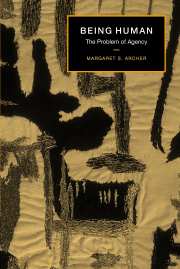Conclusion: the re-emergence of humanity
Published online by Cambridge University Press: 22 September 2009
Summary
In conclusion, I want to argue that three of our major problems in social theory are in fact interrelated. These are the ‘problem of structure and agency’, the ‘problem of subjectivism and objectivism’ and the ‘problem of agency’ itself. All hinge, in various ways, upon the causal powers of people, their nature, emergence and efficacy. Bringing real people back in, as robust and stratified beings, presents solutions to these problems which cannot be solved by the alternative strategy of impoverishing humanity. This tackles these issues by simply evacuating agency itself. It is a scenario on which humanity grows weak so that society can grow strong. This currently dominates social theorising and has been shown throughout this book to be no solution at all. On the contrary, it will only be the re-emergence of humanity, meaning that due acknowledgement is given to the properties and powers of real people forged in the real world, which overcomes the present poverty of social theory. The most important of these properties and powers is the ‘inner conversation’, as the mode of articulation between people and reality. Its exploration represents a new terrain for social theorising to discover, and if it does so it will also make the discovery of the enchantment of humankind. For value rationality is alive and well and flourishes as part of being human.
- Type
- Chapter
- Information
- Being HumanThe Problem of Agency, pp. 306 - 319Publisher: Cambridge University PressPrint publication year: 2000



